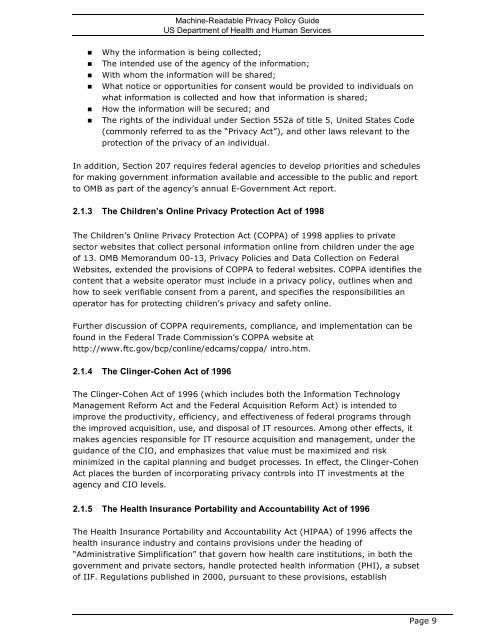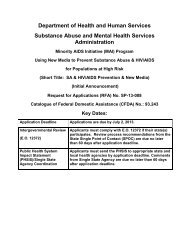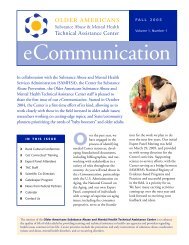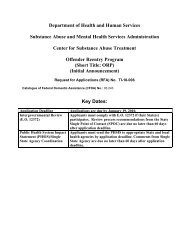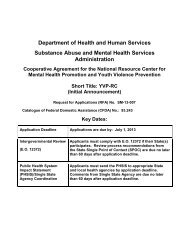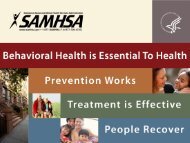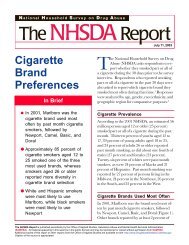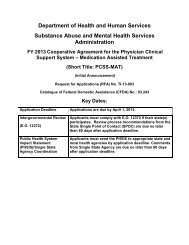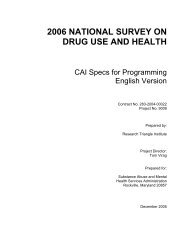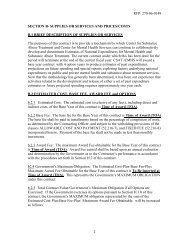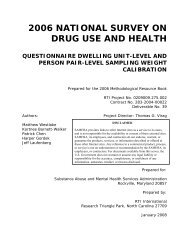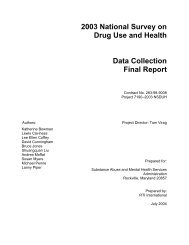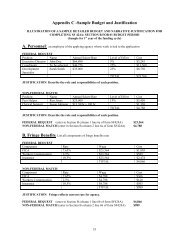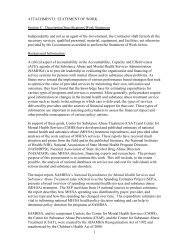HHS Machine-Readable Privacy Policy Guide - Substance Abuse ...
HHS Machine-Readable Privacy Policy Guide - Substance Abuse ...
HHS Machine-Readable Privacy Policy Guide - Substance Abuse ...
You also want an ePaper? Increase the reach of your titles
YUMPU automatically turns print PDFs into web optimized ePapers that Google loves.
<strong>Machine</strong>-<strong>Readable</strong> <strong>Privacy</strong> <strong>Policy</strong> <strong>Guide</strong><br />
US Department of Health and Human Services<br />
<br />
<br />
<br />
<br />
<br />
<br />
Why the information is being collected;<br />
The intended use of the agency of the information;<br />
With whom the information will be shared;<br />
What notice or opportunities for consent would be provided to individuals on<br />
what information is collected and how that information is shared;<br />
How the information will be secured; and<br />
The rights of the individual under Section 552a of title 5, United States Code<br />
(commonly referred to as the “<strong>Privacy</strong> Act”), and other laws relevant to the<br />
protection of the privacy of an individual.<br />
In addition, Section 207 requires federal agencies to develop priorities and schedules<br />
for making government information available and accessible to the public and report<br />
to OMB as part of the agency’s annual E-Government Act report.<br />
2.1.3 The Children’s Online <strong>Privacy</strong> Protection Act of 1998<br />
The Children’s Online <strong>Privacy</strong> Protection Act (COPPA) of 1998 applies to private<br />
sector websites that collect personal information online from children under the age<br />
of 13. OMB Memorandum 00-13, <strong>Privacy</strong> Policies and Data Collection on Federal<br />
Websites, extended the provisions of COPPA to federal websites. COPPA identifies the<br />
content that a website operator must include in a privacy policy, outlines when and<br />
how to seek verifiable consent from a parent, and specifies the responsibilities an<br />
operator has for protecting children’s privacy and safety online.<br />
Further discussion of COPPA requirements, compliance, and implementation can be<br />
found in the Federal Trade Commission’s COPPA website at<br />
http://www.ftc.gov/bcp/conline/edcams/coppa/ intro.htm.<br />
2.1.4 The Clinger-Cohen Act of 1996<br />
The Clinger-Cohen Act of 1996 (which includes both the Information Technology<br />
Management Reform Act and the Federal Acquisition Reform Act) is intended to<br />
improve the productivity, efficiency, and effectiveness of federal programs through<br />
the improved acquisition, use, and disposal of IT resources. Among other effects, it<br />
makes agencies responsible for IT resource acquisition and management, under the<br />
guidance of the CIO, and emphasizes that value must be maximized and risk<br />
minimized in the capital planning and budget processes. In effect, the Clinger-Cohen<br />
Act places the burden of incorporating privacy controls into IT investments at the<br />
agency and CIO levels.<br />
2.1.5 The Health Insurance Portability and Accountability Act of 1996<br />
The Health Insurance Portability and Accountability Act (HIPAA) of 1996 affects the<br />
health insurance industry and contains provisions under the heading of<br />
“Administrative Simplification” that govern how health care institutions, in both the<br />
government and private sectors, handle protected health information (PHI), a subset<br />
of IIF. Regulations published in 2000, pursuant to these provisions, establish<br />
Page 9


